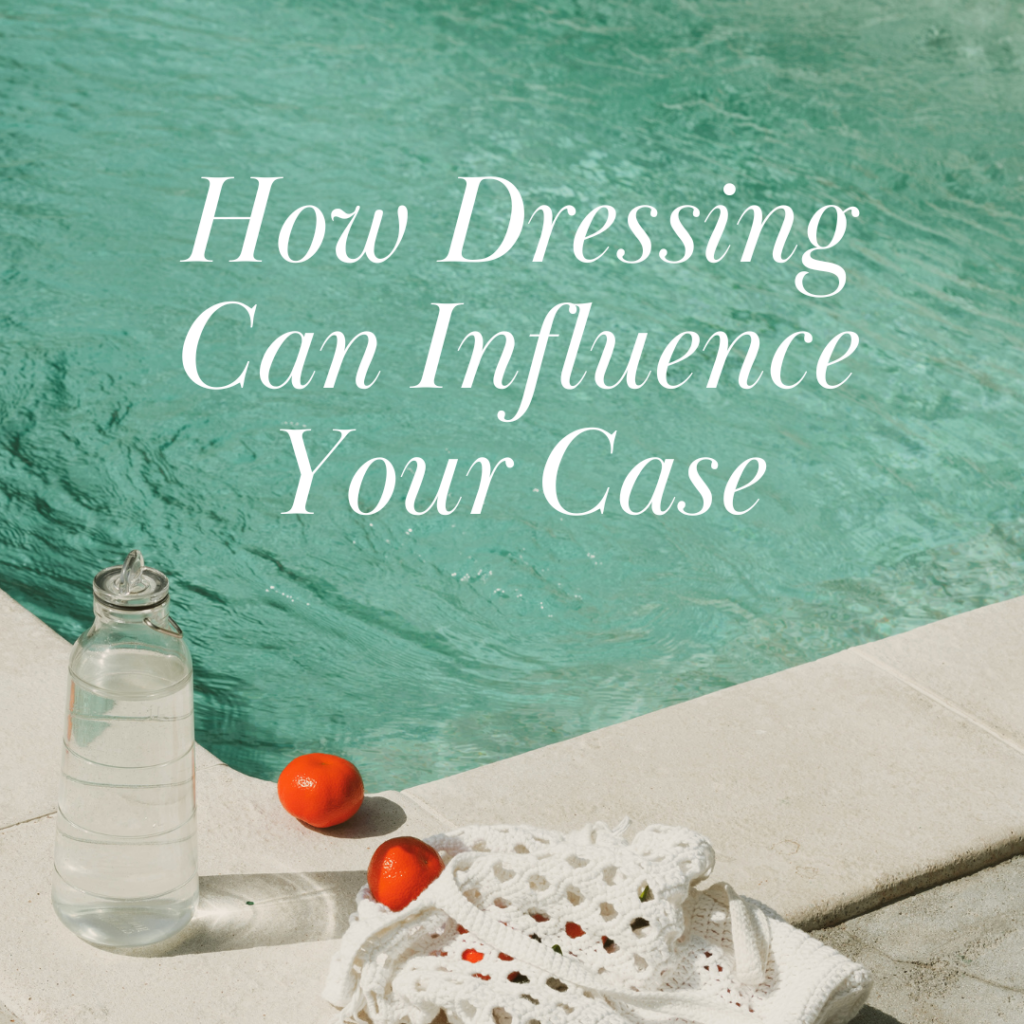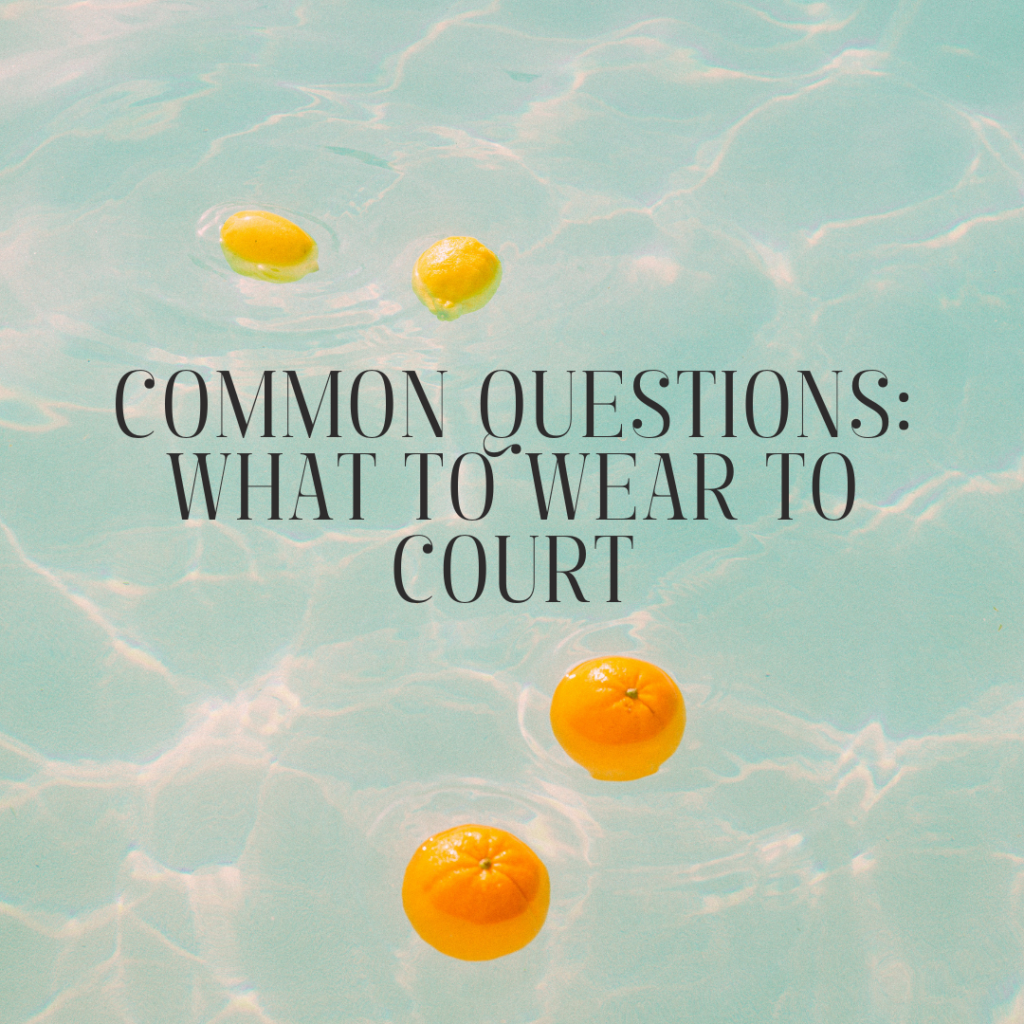What to wear to court is a question I’ve heard many times from clients, especially when they are preparing for a custody hearing. Recently, a client of mine was advised by another mom who had been through a similar situation to wear something very feminine—like a pink dress—to appear softer and more approachable. However, my client felt more comfortable in her usual work attire: a black blazer, slacks, and a blouse. Afterward, she began to wonder if the judge might have perceived her as too “career-focused” because of her outfit, leaving her uncertain about her choice.
Having been in court several times, I understand how stressful it can be to navigate these expectations and opinions. It seems like everyone has advice on how you should present yourself, but here’s what I always tell my clients: be your authentic self. If a suit makes you feel confident, wear it. If a dress or jumpsuit is more your style, go with that. The key is balancing respect for the courtroom with an outfit that empowers you and makes you feel comfortable, allowing you to focus on what truly matters.
Why What You Wear to Court Matters
If you’re unsure what to wear to court, you’re not alone. It’s a question that goes beyond just choosing an outfit; it’s about balancing professionalism with comfort and staying true to who you are. I remember the first time I walked into a courtroom. I was nervous and worried about every detail, including what I was wearing. I wondered if the judge would judge me based on my appearance. But once I dressed in a way that felt authentic and comfortable, I found that I could focus better on what truly mattered—advocating for myself and my kids. Knowing that I was dressed in something that represented me made all the difference.
When I’ve been in court since, I’ve always aimed to dress in a way that feels true to me but also polished. I’m generally a pretty casual person—most days, you’ll find me in leggings or shorts because I work from home as a high-conflict divorce coach and as a high school water polo and swim coach. But for the courtroom, I choose nice pants with a sweater or blouse, and sometimes I’ll wear a dress, like this one or this one. I’ve also worn jumpsuits like this with a belt and a cozy sweater because courthouses are always freezing.

How Dressing Can Influence Your Case
Understanding what to wear to court can influence how you’re perceived. Judges, lawyers, and court staff often make snap judgments based on appearance, and while your clothes won’t “win” or “lose” your case, they do set a tone. It’s about finding that middle ground where your attire conveys respect for the court but still feels like you.
What Helps:
- Polished but Comfortable: When you’re comfortable, it shows—wearing something that makes you feel confident projects an image of preparedness and competence.
- Respect for the Court: Dressing slightly more formally than you would for a special dinner or church service shows respect for the seriousness of the proceedings.
- Non-Verbal Cues: Your attire can send subtle signals about your personality and approach to responsibility. A neat, modest outfit can suggest that you’re organized, reliable, and considerate—qualities that are important in custody cases.
What Hurts:
- Too Formal or Too Casual: Dressing too formally—like in a stiff business suit—can make you appear unapproachable, while overly casual clothes like jeans or shorts can give the impression that you’re not taking the process seriously.
- Distracting Choices: Flashy patterns, excessive jewelry, or overly trendy outfits can shift the focus away from your words. In court, you want the judge to focus on your testimony, not your outfit—this isn’t a fashion show.
Real-Life Client Success Stories About What to Wear to Court
Over the years, I’ve worked with many clients who felt the weight of uncertainty when deciding what to wear to court. It’s one of those details that, while seemingly small, can cause a lot of stress when emotions are already running high.
One client in particular stands out to me. She felt pressured to dress more formally than usual—something like a stiff suit that wasn’t her style. She was worried that if she didn’t “dress the part,” the judge wouldn’t take her seriously. We had a long conversation about what made her feel most comfortable and confident, and she eventually chose a simple, comfortable dress that felt true to her. It wasn’t overly formal, but it was neat and respectful. After her court appearance, she called me to share how empowered she felt walking into that room. She wasn’t fidgeting with her outfit or second-guessing her choice; instead, she could focus entirely on her case. She told me that, for the first time, she truly felt like she was presenting her authentic self, and it made a huge difference.
Another client was torn between two extremes—she had been advised to dress “feminine” to appear soft and approachable, but that didn’t sit right with her. She was used to wearing tailored pants and blazers and felt more like herself in that kind of outfit. We discussed her options, and I reminded her that the most important thing was feeling comfortable in her skin. She ended up sticking with her tailored look, and afterward, she said it was the best decision she could have made. Walking into court, she felt calm and composed, knowing she wasn’t pretending to be someone she wasn’t. She said, “I felt like me—not some version of myself that I was putting on for the judge.”
These stories remind me that while everyone has an opinion on what to wear, the most important thing is finding that balance between presenting yourself respectfully and staying true to yourself. When my clients embrace their authenticity, it allows them to show up in court as their most confident selves, which is exactly what they need to do.
Have you ever felt uncertain about what to wear in court? Let’s chat about how you can show up confidently as yourself.

Common Questions: What to Wear to Court
If you’re reading this, you might be thinking, “But what if the judge doesn’t take me seriously?” or “Will I be judged based on how I look?” These are completely valid concerns—court is a big deal, and you want to make the right impression.
Here’s what I tell my clients: the most important thing is to show up as yourself. Authenticity and confidence really do go hand in hand. When you walk into that room dressed in something that feels true to who you are, you naturally project an image of someone who is prepared, credible, and self-assured. It’s not about fitting into a specific mold or meeting every expectation; it’s about presenting yourself in a way that allows you to feel comfortable to focus entirely on what matters—your testimony and your presence.
Think of it like this: when you dress in a way that feels right for you, you eliminate one less distraction. You’re no longer worried about how you look or being perceived a certain way, which frees you up to be fully present, confident, and focused on your case.
Still trying to figure out how to approach your court appearance? Reach out for personalized advice—I’m here to help.
Empowerment: Preparing Emotionally for What to Wear to Court
Preparing for court isn’t just about what to wear to court or the documents you bring—it’s also about managing the emotional and psychological pressure that comes with stepping into such an intense environment. Court can be overwhelming, especially when the stakes are high, so it’s essential to take care of your mental and emotional well-being as much as your physical preparation. Here are a few ways to empower yourself emotionally:
- Acknowledge Your Emotions: It’s normal to feel anxious, overwhelmed, or even fearful before going to court. Recognize these feelings as a natural response to stress, and remind yourself that it’s okay to feel this way.
- Practice Self-Care Ahead of Time: In the days leading up to your court date, prioritize self-care routines that help you relax and recharge. This could be anything from taking a warm bath, going for a walk at the beach, or journaling.
- Lean on Your Support System: Reach out to friends, family, or a coach for support. Sometimes, just knowing you have people who believe in you can give you the strength to walk into the courtroom with confidence.
- Trust in Your Preparation: When emotions start to feel overwhelming, remind yourself of the work you’ve done to prepare. You’ve organized your documents and chosen an outfit that makes you feel confident and mentally prepared for the day. Trusting that you are ready and capable can help ground you when the pressure feels intense.
Final Thoughts: You Are More Than What You Wear to Court
Showing up for court is an act of courage, no matter the outcome. You’re already demonstrating incredible strength and resilience by stepping into that room and advocating for yourself. Remember, your outfit is just one piece of the puzzle—it’s your authenticity, your story, and your courage that truly matter. The confidence you bring from feeling comfortable and true to yourself can be the most powerful tool you have.
Court is just one step in your journey, not the final destination. The outcome of any single day doesn’t define your worth or the progress you’ve made. What matters is that you show up as you—comfortable, polished, and authentic. Trust in the work you’ve done to prepare, and know that your authenticity is your greatest asset.


